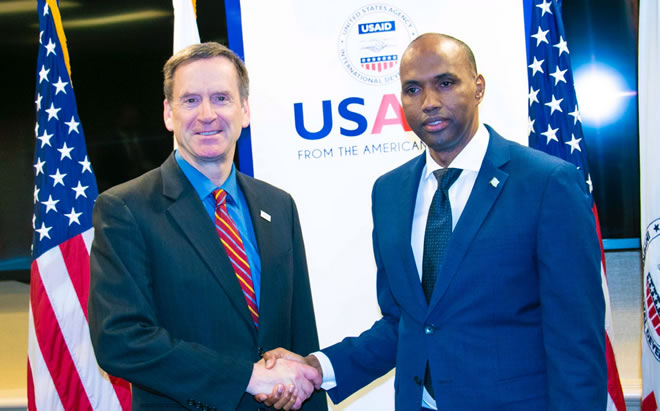
Tuesday June 18, 2019

USAID administrator Mark Green and Somali Prime Minister Hassan Ali Khayre - Photo file
NAIROBI — The U.S. government reopened a permanent mission of the U.S. Agency for International Development in Somalia on Monday, 28 years after it closed when civil war led to the collapse of the central government.
The decision to reopen a mission, according to USAID, was fueled by the Somali government’s “commitment t
The United States is the largest donor of humanitarian assistance to Somalia, providing nearly $672 million since 2018, according to USAID.
This move is part of a series of steps taken by the U.S. government to revive ties with the East African nation. Last year, the U.S. government reestablished a permanent diplomatic presence in Somalia, which was also severed in 1991.
“We want to help advance peace and stability, strengthen governing institutions, and help create the conditions for economic investment and growth,” said USAID Administrator Mark Green during a ribbon cutting ceremony in Mogadishu on Monday.
‘Political dimension’
But the reopening of the USAID mission also has a “very political dimension,” said Matt Bryden, strategic adviser to Sahan, a Somalia-focused think tank. It could be used to bolster the central government’s dismissal of federal member states, he said.
The Federal Government of Somalia was established in 2012 under a provisional constitution, with six member states, including Somaliland, Puntland, Galmudug, Hirshabelle, South West State, and Jubaland. It also includes an administrative region in Mogadishu, where the central government is located. Despite international efforts to stabilize the country, the central government in Mogadishu still has limited reach.
The relationship between these member states and the central government is tense, with disagreements including how the central government has handled security, how much autonomy should be given to member states and how foreign aid should be distributed.
“Under the current administration, we’ve seen a very highly centralizing, monopolistic approach to this state-building process, which has alienated most of the federal member states, and much of the population,” Bryden said.
This political impasse has “continued to hamper progress on key political and security processes,” according to a U.N. Security Council report from May.
Moving the USAID office from Nairobi, Kenya, to Mogadishu would have symbolic implications that could increase tensions between the central government and member states, Bryden said.
“The U.S. is widely perceived as one of the most supportive Western partners of a centralist approach that encourages the federal government to feel that it can ignore the provisional constitution and get away with dismissive relations with the federal member states,” he said.
“The opening of a USAID office is likely to reinforce the impression that the federal government has the wind at its back and can count on external financial largesse.”
Elections, security, debt relief
General elections are expected to be held next year in Somalia — the first popular vote in the country since 1969. The current president was elected by members of parliament. The African Union is also transitioning out of its security role, with the Somali security forces expected to take over this responsibility. The country is also seeking debt relief.
“The most constructive thing external powers can do is encourage the federal government to engage with the federal member states and negotiate the completion of the transition,” Bryden said.
Green, during a press conference in Nairobi on Tuesday, said that the U.S. government has placed pressure on the central government to cooperate with federal member states in its conversations about reforms needed in order for Somalia to achieve debt relief.
“A big part of that is making sure they are connected with, working with, listening to, and partnering with the external governments,” he said. “So that we have a government that represents not merely one part of the country, but the entire country. The prime minister made it very clear to us that he is committed to that.”